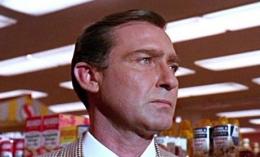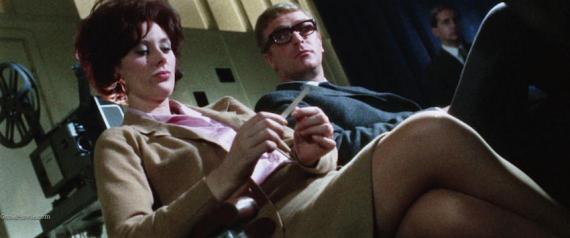As a brief interlude during our Licence To Watch marathon of every Bond film we checked out The Ipcress File; a film created, in part, to provide a counterpoint to the stylish and increasingly unrealistic Bond series.
The Ipcress File, adapted from Len Deighton’s 1962 novel, shares a fair bit of genetic heritage with James Bond. It was released to cinemas in the same year as Thunderball, 1965, (though it pre-empted the Bond movie in the UK by several months); both films share some key members of the crew (producer Harry Saltzman, editor Peter Hunt and composer John Barry); and the two films share at least one cast member.
However, other than the fact that the main protagonist in both films performs espionage for the UK government, that’s where the similarities end. The makers of The Ipcress File quite purposefully made Harry Palmer’s day-job as mundane as possible: he works in an office; he goes to the supermarket; he cooks his own food. There are no gadgets (at least none at Palmer’s disposal); there are no exotic locations (even the suggestion that he’s been whisked off to Albania at the end proves to be a ruse); and there’s only one ‘girl’ who, by Bond standards, is down to earth and eminently self-sufficient.
Given the above, there’s great irony in the fact that The Ipcress File ends up being more stylish than most Bond films could ever hope to be. Harry Palmer is an icon of sixties cinema; Bond is an immortal character, but he’s surrounded by icons rather than being one himself. The mundane nature of the setting makes the drama more relatable, and all the more threatening for it: you could imagine being locked up in an East end warehouse; less so a cartel of megalomaniacal supervillains holding the world to ransom. The humour in the film comes from character (“And he doesn’t have my sense of humour…”) rather than forced double entendres.

The Ipcress File even does ‘stuffy British establishment’ better than the Bond films (though you can’t knock Desmond Llewelyn). Colonel Ross and Major Dalby, played by Guy Doleman and Nigel Green respectively, are so clipped and mannered that you could almost imagine folding them in half and filing them away. Yet, the two actors, despite their characters betraying almost no emotion, almost steal the film. It’s remarkable that Guy Doleman also appeared in Thunderball, in the highly forgettable role of Count Lippe, and yet here delivers probably one of my favourite cinema performances of all time. Nigel Green, acting almost entirely with his moustache and eyebrows, is just as indelible.
If it weren’t for his native charm, Michael Caine’s equally matter-of-fact performance would almost be lost. But, of course, this is Michael Caine we’re talking about: a man whose worst performance still trumps the best most of today’s actors can give. It’s entertaining to think what sort of a Bond he would have made. I think he would have been awesome, but it would have been a subversive Bond; not the sort that gives the occasional knowing wink to the audience in the way that Connery does, but one who would be more likely to say: “What a load of crock, eh? Anyone fancy a pint?”
